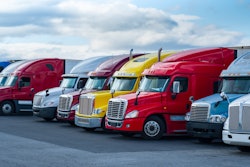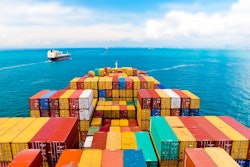
Nearly 50% of U.S. transportation and logistics (T&L) companies are utilizing basic data analytics, with 34% citing use of artificial intelligence (AI) capabilities in their operations, according to a study by HERE Technologies, developed in part with Amazon Web Services (AWS) and conducted by YouGov.
This quantifies the underutilization of processes and solutions that will modernize logistics operations, streamline processes and inform strategic decision-making, such as route optimization and machine learning.
“On one hand, this study shows the progress being made by companies towards increasing their supply chain visibility. On the other hand, it’s clear the industry currently lacks the contextual data, AI capabilities and tools needed to optimize fleet deployments, routing, and appropriate mode switching,” says Remco Timmer, VP of product management at HERE Technologies. “As a result, we’re seeing increased demand for location data and services that enable logistics companies to overcome disruptions in real-time while reducing emissions and improving employee safety in the process.”
Key takeaways:
- The study identified that U.S. T&L companies cite cost (23%), fear of disrupting existing processes/services (12%) and trouble identifying the right partners/suppliers (11%) as the biggest barriers to implementing technology into their organizations’ supply chain management.
- However, according to the multi-country survey, the United States is leading in this category as logistics firms in Germany (71%) and the UK (60%) reported higher underutilization of basic data analytics and AI implementation.
● Location data and Internet of Things (IoT) are being utilized the most (38%).
● Nearly half (44%) of American logistics firms are leveraging mapping and location data for driver routing purposes.
● When considering building or buying technology, 35% of respondents answered they would fully develop in-house, 29% would buy off-the-shelf solutions from external providers and 29% would use a hybrid approach of purchasing systems from external providers and integrating their own data.
● The study reveals a significant gap in the prioritization of sustainability among logistics companies in the United States, with more than half of American logistics companies (55%) indicating an absence currently of sustainability goals tailored for their T&L operations.
● Respondents emphasized increasing customer satisfaction (23%) and drivers’ safety (19%) as the most important, and about one-third of respondents (33%) ranked sustainability as the least important.
● U.S. logistics companies are leading Germany and UK companies in supply chain sustainability, with German (66%) and UK (60%) logistics companies, respectively, not having currently tailored sustainability goals for their T&L operations.
● A vast majority (86%) of companies have made notable progress toward supply chain visibility. While a smaller percentage of respondents (18%) consider their progress significant, the results reflect the steady adoption of technologies and processes required to enhance supply chain visibility.
● The modes respondents cited to have the most real-time visibility were truck operations (50%), followed by air freight (18%) and last mile (17%). The mode reported to have the least real-time visibility is ocean operations (45%).
● The study also analyzed where U.S. companies are placing the most value when it comes to improving supply chain visibility, with leading responses including real-time tracking (58%), route optimization (38%), inventory management (34%), demand planning (32%) and communication with trading partners (32%).


















![Pros To Know 2026 [color]](https://img.sdcexec.com/mindful/acbm/workspaces/default/uploads/2025/08/prostoknow-2026-color.mduFvhpgMk.png?ar=16%3A9&auto=format%2Ccompress&bg=fff&fill-color=fff&fit=fill&h=135&q=70&w=240)